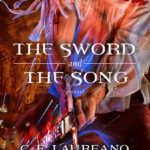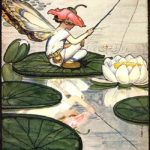What Does God Think Of Fantasy?
If we took a poll with the question, What do you believe God thinks about fantasy, I wonder what kinds of responses we’d get. Let’s say the choices were, a) He approves; b) He disapproves; c) He has no opinion one way or the other; d) it depends on how the fantasy is used; e) who cares—what percentage of responses do you think would say God actually approves of fantasy?
Perhaps people who frequent Speculative Faith are not the right people for this question. I mean, I assume those of you reading this article have stopped by our site because you have some interest in one or more of the genres slotted under the general heading “Speculative.” In that case, those with a Christan worldview more than likely have resolved the question I’m posing.
Or have we?
Perhaps we’ve answered a tangential question—is fantasy permissible for a Christian to enjoy (as a reader or as a writer)? I want to go beyond “permissible” to “preferred”—what genre does God prefer? What genre does He approve?
I think an excellent case can be built for God not favoring one genre over another, with a few exceptions (erotica comes to mind). However, I want to suggest that fantasy might be a little different.
The obvious is that fantasy contains a good-versus-evil motif which fits the spiritual paradigm laid out in the Bible. The devil is our adversary, we are to put on spiritual armor, the Word of God is a sword, we are to fight the good fight of faith, and on and on. Clearly the Bible deals more with conflict—God and those who are His in opposition to whatever stands against Him—than it does with tolerance.
There’s a second reason. God created Man in His own image, after His likeness.
That means we have a will because God does. We have intellect and emotions because He does. We are relational beings, communicators because He is, and we are creative by nature because He is.
It’s fair to say, I believe, that our imagination is part of that “in His image” package. We imagine only because God imagines. Of course He has the added aspect of knowing the answers to any “what if” scenarios, but I’m focusing here on how we are similar to our Creator, not how we differ.
Fantasy, of course, stretches the imagination. It also requires a level of creation that many other genres don’t require. In short, as a genre, it engages man in our image-bearer state.
There’s a third evidence that suggests God approves of fantasy. The Bible is full of symbolism and types, as is fantasy. Moses, the deliverer of Israel, is a type of Christ. The bronze serpent the Israelites lifted up in the desert was a symbol of Him. Jesus referred to Himself as bread, living water, the good shepherd, the vine, the door, and other analogous objects. While other genres may employ symbolic elements, none seems more fitting than fantasy.
This “fit for symbolism” aspect relates to one of the core elements of fantasy—the presence of the magical. Or the miraculous or supernatural, if you prefer. In other words, fantasy takes a step beyond the rational and allows for that which science cannot explain. Certainly this freedom from the constraints of the mundane lends itself to an exploration of the spiritual—the very thing that is at the heart of the Bible.
There’s a final indication that fantasy has a place on God’s list of approved genres—the Bible records several fantasies. One of the longest is in the book of Judges (9:7ff) and starts out like this:
Listen to me, O men of Shechem, that God may listen to you. “Once the trees went forth to anoint a king over them, and they said to the olive tree, ‘Reign over us!'”
A story in which trees talk? Fantasy.
Here’s another one, much shorter in the version recorded in Scripture (2 Kings 14:9):
Jehoash king of Israel sent to Amaziah king of Judah, saying, “The thorn bush which was in Lebanon sent to the cedar which was in Lebanon, saying, ‘Give your daughter to my son in marriage.’ But there passed by a wild beast that was in Lebanon, and trampled the thorn bush.
A cedar looking for a marriage match for his son? Fantasy.
So how about it, does God approve of fantasy? For me, the evidence is overwhelming. He does approve indeed.
It’s what writers do with the fantasy tool He’s given us that may still be up for debate. 😉







































Great post.
Of course there is romance in the Bible, too. And action/adventure and contemporary and poetry and historical narrative and mystery and…. 🙂 I think God just plain approves of story. But I agree that fantasy lends itself to analogy and symbolism a little more easily than some of the other genres. Maybe.
I love all those elements! … within an awesome speculative/visionary meta-story.
Apparently God shares this preference. Throughout Scripture, all the romance, poetry, rules, narrative, mystery, surprising revelations, etc., is in the context of His meta-narrative of the Gospel. That itself is the most incredible real-life “fantasy” ever: that a perfect God could do the impossible, satisfy His own holy justice and also demonstrate His amazing love and lavish grace and mercy.
For that reason, I submit that visionary stories just might be the most “Biblical” genre.
More: in the future New Heavens and New Earth, it will likely be visionary “fiction” elements that we God’s people will experience forever. Much of our “fantasy” today will be “contemporary” in that world. And suddenly Amish fiction will seem to strange. …
A wonderful post! I hadn’t considered those particular Old Testament parables as fantasy before, but of course you’re absolutely right — what other genre has anthropomorphic talking plants in it? I wish that some of the people I’ve met who fear and distrust the fantasy genre as “un-Christian” could read this post and reconsider their thinking.
Sally and Stephen, the reason I opened this post as I did was precisely because of what you both noted. Obviously God as the one from whom our creativity stems, delights in those other genres, too. But I can’t help it—from a human perspective, it seems like fantasy is more naturally aligned with spiritual things and therefore God would like it more. 😀
R. J., please feel free to copy this post and use it as you see fit. I really did write it to help others answer those who haven’t thought the subject through, who slam the door on the entire genre because of a twitchy reaction to their misconceptions.
Becky
Just to play devil’s advocate…
The Bible has a lot of things in it. It contains a man entering a king’s home under a ruse and stabbing him through the gut, then getting away with it because the servants were embarrassed to go check on him. It contains two sisters seducing their father. A man offering his daughters to be gang-raped. A priest who….well, Judges is admittedly a dark book. It has a prophet who’s told not to mourn his wife’s death, a prophet who wants genocide to happen, and a prophet who runs naked in the streets. It contains a town from whence we get the word “sodomy.” It contains the good guys getting lynched and the bad guys winning. There’s one where a guy becomes God’s executioner, but because of the malice he unleashes, he is himself judged. And one where this serial killer winds up getting struck by lightning and goes on three mission trips.
I’m just saying, just like I do when people say “Well, Jesus did it!” Jesus took a whip and cleaned out a church. I’m just saying, I think some things we better think about before doing, and especially before throwing out “The Bible tells me so!” Lots of crazy happens that way.
Part of my suggested answer would be that not everything the Bible described is prescribed (contrary to some people, for example, who think a patriocentric or father-centered lifestyle is “Biblical” because it’s described in parts of Scripture). Knowing that, we can know which parts of the Bible are included for illustration, and which are for imitation. It helps to have specific epistle-writers’ instructions — for example, Paul talking about how Christians ought to live in light of the Gospel. And it’s that Gospel that is itself the main story of Scripture: miraculous, fantastic, and illustrative of God’s ultimate reason for inspiring the Bible. That seems a good hint that fantastic stories that similarly include the miraculous and the fantastic, and honor Himself, meet with His approval.
Well said Kaci.
Story matters so deeply to God, and to man, it has perhaps the greatest effect on man of any means of communication (though I would argue music does as well) that any venture into the realm of Story should be done with deep prayer, and faithful desire to share only what God wants to share.
This is not to say that the secular world doesn’t often, without planning on it, share God’s Grace in their story…Grace is so overabundant in this world it literally drips out of any venture into art and beauty. Not always, I will admit. But far more often than we think.
Anyways.
I don’t know if I personally would go so far as to say God prefers one genre over another. But I’m quite certain he approves of the fantasy genre. All you have to do is consider how many of us fell in love with Aslan before we fell in love with Christ, to believe God has blessed this genre.
But to be nit-picky, I do have to point out that God wrote erotica — Song of Solomon! I still blush at some of the verse in that book! 🙂
Why, Stephanie! Song of Solomon’s main point is to show how much Jesus loves a Christian! … Or how much He loves His Church. That’s exactly how I read it, with all that mushy erotic stuff secondary (if at all). How do you read it?
Nah, I’m only fooling, of course. 😀 Reading the Song according to the “rules” of its literary genre, applying right hermeneutics and exegesis, makes it impossible to turn it into only allegory. I’m sure it’s there, though, but only as any marriage portrays the love Christ has for His Church, the original prototype union to which marriage pointed as a symbol (Ephesians 5).
And if one reads the Song only (or primarily) as a Spiritual Allegory, things can get really gross — as I’m sure you may have found!
Meanwhile, agreed: it would be presumptuous to say or think that “our genre is the most spiritual genre” or God’s number-1 pick, just as presumptuous as other readers who believe their preferred genre is the cleanest or most decent because all the kissing is “chaste” and everyone keeps their clothes on (comparing your book only with the bad guys to prove your pick’s benefits — great strategy).
Yet one can say — as Becky has said here — that fantasy is closest to the overarching genre of Scripture, and thus epic His-story itself: the story of the Gospel, how God pulled off the incredible, “magical” miracle of staying true to Himself and His holiness yet also showing His character of love and mercy in ways we wouldn’t have believed had we not rebelled against Him. While other parts of Scripture describe miracles and more-specific “fantasy”-like circumstances, the miraculous, epic Gospel is the big story, which (I believe) all Christians’ fantasy should reflect to some degree.